consider的用法
- 格式:doc
- 大小:37.50 KB
- 文档页数:2
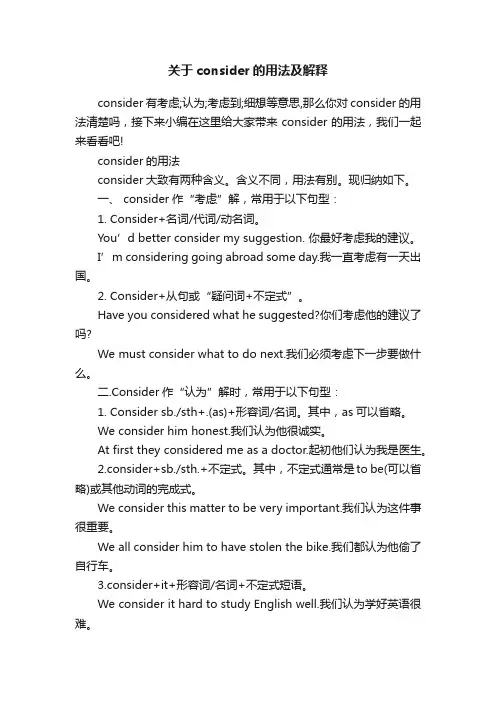
关于consider的用法及解释consider有考虑;认为;考虑到;细想等意思,那么你对consider的用法清楚吗,接下来小编在这里给大家带来consider的用法,我们一起来看看吧!consider的用法consider大致有两种含义。
含义不同,用法有别。
现归纳如下。
一、 consider作“考虑”解,常用于以下句型:1. Consider+名词/代词/动名词。
You’d better consider my suggestion. 你最好考虑我的建议。
I’m considering going abroad some day.我一直考虑有一天出国。
2. Consider+从句或“疑问词+不定式”。
Have you considered what he suggested?你们考虑他的建议了吗?We must consider what to do next.我们必须考虑下一步要做什么。
二.Consider作“认为”解时,常用于以下句型:1. Consider sb./sth+.(as)+形容词/名词。
其中,as可以省略。
We consider him honest.我们认为他很诚实。
At first they considered me as a doctor.起初他们认为我是医生。
2.consider+sb./sth.+不定式。
其中,不定式通常是to be(可以省略)或其他动词的完成式。
We consider this matter to be very important.我们认为这件事很重要。
We all consider him to have stolen the bike.我们都认为他偷了自行车。
3.consider+it+形容词/名词+不定式短语。
We consider it hard to study English well.我们认为学好英语很难。
I consider it my duty to help you with your studies.我认为帮助你学习英语是我的职责。

consider的用法归纳有哪些consider的用法:作名词consideration作名词,意为careful thought and attention斟酌,考虑Several considerations have influenced my decision.好几个因素影响了我的决定。
1.Consideration for顾及,体贴He has never shown much consideration for his wife’s needs.他从来不顾及他妻子的需要。
2.Under consideration在讨论/考虑中Several projects are under consideration.好几个项目在讨论中。
There are some proposals under consideration. 有几个建议在审议中。
3.Take sth. into consideration考虑到某事,体谅Your teachers will take your recent illness into consideration when marking your exams. 你的几位老师在给你的考试评分时,会考虑你最近生病这一情况的。
4.Leave sth. out of consideration 忽略/不重视某事It was wrong to leave my feelings out of consideration.不顾及我的情感是不对的。
5.Show consideration for体谅,顾及Jeff never shows any consideration for his mother’s feelings.杰夫从来不体谅他母亲的感受。
6.of. No / little consideration无关紧要的,不重要的Whether he would go with us or not was of no consideration. 他是否跟我们一起去是无关紧要的。
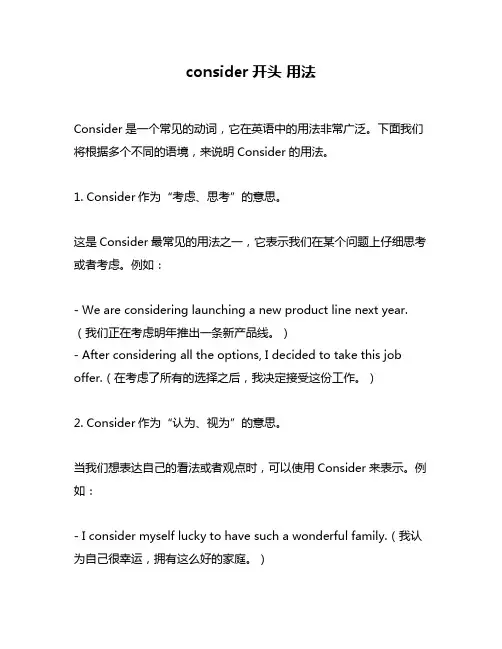
consider开头用法Consider是一个常见的动词,它在英语中的用法非常广泛。
下面我们将根据多个不同的语境,来说明Consider的用法。
1. Consider作为“考虑、思考”的意思。
这是Consider最常见的用法之一,它表示我们在某个问题上仔细思考或者考虑。
例如:- We are considering launching a new product line next year.(我们正在考虑明年推出一条新产品线。
)- After considering all the options, I decided to take this job offer.(在考虑了所有的选择之后,我决定接受这份工作。
)2. Consider作为“认为、视为”的意思。
当我们想表达自己的看法或者观点时,可以使用Consider来表示。
例如:- I consider myself lucky to have such a wonderful family.(我认为自己很幸运,拥有这么好的家庭。
)- Some people consider him to be the best CEO in the industry.(有些人认为他是这个行业中最好的CEO。
)3. Consider作为“细想、详细观察”的意思。
在这种情况下,Consider的意思是说我们对某个事物进行了深入的思考或者观察。
例如:- He asked us to consider the problem from all angles before making a decision.(他要求我们在做出决定之前,从多个角度考虑这个问题。
)- You need to carefully consider your options before buying a new car.(在购买新车之前,你需要仔细的考虑你的选择。
)4. Consider作为“权衡、斟酌”的意思。
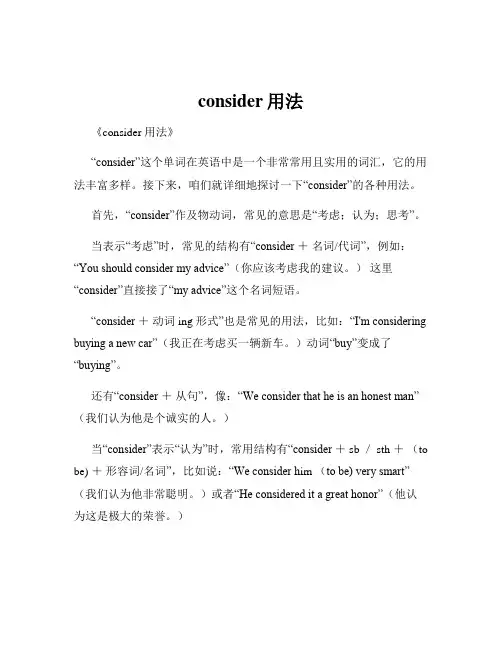
consider用法《consider 用法》“consider”这个单词在英语中是一个非常常用且实用的词汇,它的用法丰富多样。
接下来,咱们就详细地探讨一下“consider”的各种用法。
首先,“consider”作及物动词,常见的意思是“考虑;认为;思考”。
当表示“考虑”时,常见的结构有“consider +名词/代词”,例如:“You should consider my advice”(你应该考虑我的建议。
)这里“consider”直接接了“my advice”这个名词短语。
“consider +动词 ing 形式”也是常见的用法,比如:“I'm considering buying a new car”(我正在考虑买一辆新车。
)动词“buy”变成了“buying”。
还有“consider +从句”,像:“We consider that he is an honest man”(我们认为他是个诚实的人。
)当“consider”表示“认为”时,常用结构有“consider + sb / sth +(to be) +形容词/名词”,比如说:“We consider h im (to be) very smart”(我们认为他非常聪明。
)或者“He considered it a great honor”(他认为这是极大的荣誉。
)在一些特定的语境中,“consider”还会和一些介词搭配使用。
比如“consider as”,意思是“把看作”,像“He considers her as his best friend”(他把她看作他最好的朋友。
)另外,“consider”还有一些需要注意的地方。
它用于进行时态时,通常表示“正在考虑”,强调动作正在进行。
例如:“She is considering changing her job”(她正在考虑换工作。
)而且,“consider”的否定形式通常是在前面加上“do not consider”或者“don't consider”,而不是“consider not”。
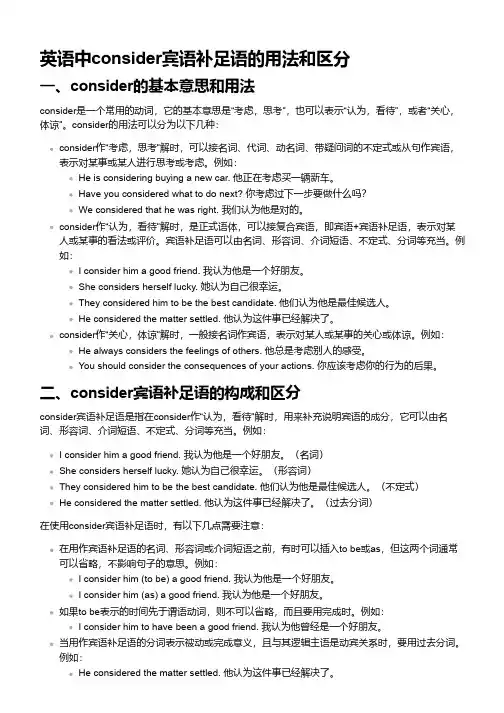
英语中consider宾语补足语的用法和区分一、consider的基本意思和用法consider是一个常用的动词,它的基本意思是“考虑,思考”,也可以表示“认为,看待”,或者“关心,体谅”。
consider的用法可以分为以下几种:consider作“考虑,思考”解时,可以接名词、代词、动名词、带疑问词的不定式或从句作宾语,表示对某事或某人进行思考或考虑。
例如:He is considering buying a new car. 他正在考虑买一辆新车。
Have you considered what to do next? 你考虑过下一步要做什么吗?We considered that he was right. 我们认为他是对的。
consider作“认为,看待”解时,是正式语体,可以接复合宾语,即宾语+宾语补足语,表示对某人或某事的看法或评价。
宾语补足语可以由名词、形容词、介词短语、不定式、分词等充当。
例如:I consider him a good friend. 我认为他是一个好朋友。
She considers herself lucky. 她认为自己很幸运。
They considered him to be the best candidate. 他们认为他是最佳候选人。
He considered the matter settled. 他认为这件事已经解决了。
consider作“关心,体谅”解时,一般接名词作宾语,表示对某人或某事的关心或体谅。
例如:He always considers the feelings of others. 他总是考虑别人的感受。
You should consider the consequences of your actions. 你应该考虑你的行为的后果。
二、consider宾语补足语的构成和区分consider宾语补足语是指在consider作“认为,看待”解时,用来补充说明宾语的成分,它可以由名词、形容词、介词短语、不定式、分词等充当。
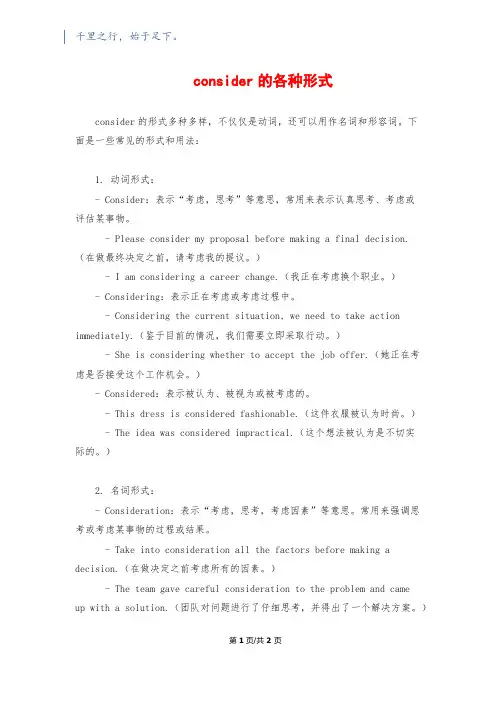
千里之行,始于足下。
consider的各种形式consider的形式多种多样,不仅仅是动词,还可以用作名词和形容词。
下面是一些常见的形式和用法:1. 动词形式:- Consider:表示“考虑,思考”等意思,常用来表示认真思考、考虑或评估某事物。
- Please consider my proposal before making a final decision.(在做最终决定之前,请考虑我的提议。
)- I am considering a career change.(我正在考虑换个职业。
)- Considering:表示正在考虑或考虑过程中。
- Considering the current situation, we need to take action immediately.(鉴于目前的情况,我们需要立即采取行动。
)- She is considering whether to accept the job offer.(她正在考虑是否接受这个工作机会。
)- Considered:表示被认为、被视为或被考虑的。
- This dress is considered fashionable.(这件衣服被认为时尚。
) - The idea was considered impractical.(这个想法被认为是不切实际的。
)2. 名词形式:- Consideration:表示“考虑,思考,考虑因素”等意思。
常用来强调思考或考虑某事物的过程或结果。
- Take into consideration all the factors before making a decision.(在做决定之前考虑所有的因素。
)- The team gave careful consideration to the problem and cameup with a solution.(团队对问题进行了仔细思考,并得出了一个解决方案。
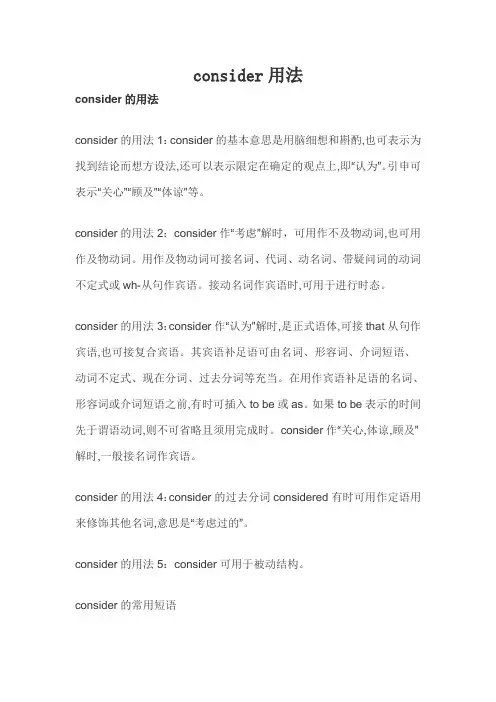
consider用法consider的用法consider的用法1:consider的基本意思是用脑细想和斟酌,也可表示为找到结论而想方设法,还可以表示限定在确定的观点上,即“认为”。
引申可表示“关心”“顾及”“体谅”等。
consider的用法2:consider作“考虑”解时,可用作不及物动词,也可用作及物动词。
用作及物动词可接名词、代词、动名词、带疑问词的动词不定式或wh-从句作宾语。
接动名词作宾语时,可用于进行时态。
consider的用法3:consider作“认为”解时,是正式语体,可接that从句作宾语,也可接复合宾语。
其宾语补足语可由名词、形容词、介词短语、动词不定式、现在分词、过去分词等充当。
在用作宾语补足语的名词、形容词或介词短语之前,有时可插入to be或as。
如果to be表示的时间先于谓语动词,则不可省略且须用完成时。
consider作“关心,体谅,顾及”解时,一般接名词作宾语。
consider的用法4:consider的过去分词considered有时可用作定语用来修饰其他名词,意思是“考虑过的”。
consider的用法5:consider可用于被动结构。
consider的常用短语consider over (v.+prep.)考虑… think about (sth)consider over sthconsider相关词汇辨析consider,think,believe,count,deem,reckon,regard这些动词均含有“认为”之意。
consider 指经过考虑和观察后得出的结论。
think 普通用词,指按照自己的意见提出看法。
believe 通常指根据一定的证据,经思考后而认为属实。
count 指作出判断后而得出的看法等。
deem 正式用词,常用于法律、文学,强调作判断而不是思考。
reckon 指对人或事作全面“权衡”,把各方面意见考虑进去后得出结论。
regard 侧重凭外表或表面现象作判断。
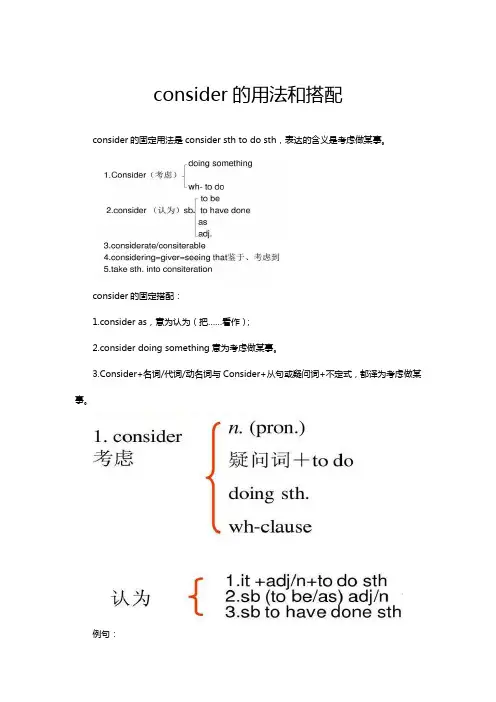
consider的用法和搭配
consider的固定用法是consider sth to do sth,表达的含义是考虑做某事。
consider的固定搭配:
1.consider as,意为认为(把……看作);
2.consider doing something意为考虑做某事。
3.Consider+名词/代词/动名词与Consider+从句或疑问词+不定式,都译为考虑做某事。
例句:
You should consider other people before you act.
你在行动之前应当考虑到别人。
As you design your system, consider how it should be tested.
在你设计你的系统时,考虑到它将如何被测试。
I wrote about license and work properties you should consider when you select
a license.
还介绍了在选择一个许可时,您应该考虑到的许可和作品署名。
All of these are things they might consider.
所有这些事情都是他们应该考虑到的。
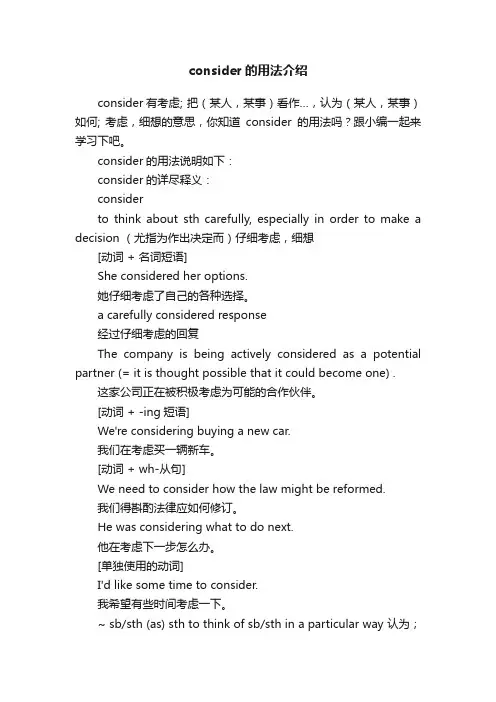
consider的用法介绍consider有考虑; 把(某人,某事)看作…,认为(某人,某事)如何; 考虑,细想的意思,你知道consider的用法吗?跟小编一起来学习下吧。
consider的用法说明如下:consider的详尽释义:considerto think about sth carefully, especially in order to make a decision (尤指为作出决定而)仔细考虑,细想[动词 + 名词短语]She considered her options.她仔细考虑了自己的各种选择。
a carefully considered response经过仔细考虑的回复The company is being actively considered as a potential partner (= it is thought possible that it could become one) .这家公司正在被积极考虑为可能的合作伙伴。
[动词 + -ing短语]We're considering buying a new car.我们在考虑买一辆新车。
[动词 + wh-从句]We need to consider how the law might be reformed.我们得斟酌法律应如何修订。
He was considering what to do next.他在考虑下一步怎么办。
[单独使用的动词]I'd like some time to consider.我希望有些时间考虑一下。
~ sb/sth (as) sth to think of sb/sth in a particular way 认为;以为;觉得[动词 + 名词短语 + 名词短语]This award is considered (to be) a great honour.这项奖被视为极大的荣誉。
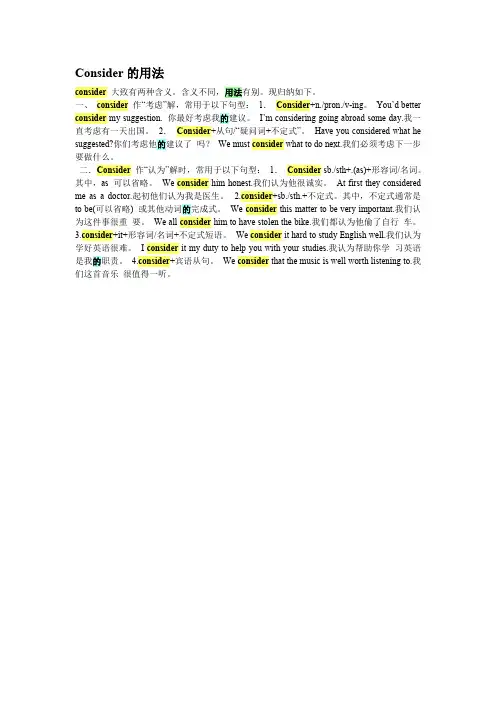
Consider的用法consider大致有两种含义。
含义不同,用法有别。
现归纳如下。
一、consider作“考虑”解,常用于以下句型:1.Consider+n./pron./v-ing。
You’d better consider my suggestion. 你最好考虑我的建议。
I’m considering going abroad some day.我一直考虑有一天出国。
2.Consider+从句/“疑问词+不定式”。
Have you considered what he suggested?你们考虑他的建议了吗?We must consider what to do next.我们必须考虑下一步要做什么。
二.Consider作“认为”解时,常用于以下句型:1.Consider sb./sth+.(as)+形容词/名词。
其中,as 可以省略。
We consider him honest.我们认为他很诚实。
At first they considered me as a doctor.起初他们认为我是医生。
2.consider+sb./sth.+不定式。
其中,不定式通常是to be(可以省略) 或其他动词的完成式。
We consider this matter to be very important.我们认为这件事很重要。
We all consider him to have stolen the bike.我们都认为他偷了自行车。
3.consider+it+形容词/名词+不定式短语。
We consider it hard to study English well.我们认为学好英语很难。
I consider it my duty to help you with your studies.我认为帮助你学习英语是我的职责。
4.consider+宾语从句。
We consider that the music is well worth listening to.我们这首音乐很值得一听。

consider用法consider用法consider的用法consider的用法1:consider的基本意思是用脑细想和斟酌,也可表示为找到结论而想方设法,还可以表示限定在确定的观点上,即“认为”。
引申可表示“关心”“顾及”“体谅”等。
consider的用法2:consider作“考虑”解时,可用作不及物动词,也可用作及物动词。
用作及物动词可接名词、代词、动名词、带疑问词的动词不定式或wh-从句作宾语。
接动名词作宾语时,可用于进行时态。
consider的用法3:consider作“认为”解时,是正式语体,可接that从句作宾语,也可接复合宾语。
其宾语补足语可由名词、形容词、介词短语、动词不定式、现在分词、过去分词等充当。
在用作宾语补足语的名词、形容词或介词短语之前,有时可插入to be或as。
如果to be表示的时间先于谓语动词,则不可省略且须用完成时。
consider作“关心,体谅,顾及”解时,一般接名词作宾语。
consider的用法4:consider的过去分词considered有时可用作定语用来修饰其他名词,意思是“考虑过的”。
consider的用法5:consider可用于被动结构。
consider的常用短语consider over (v.+prep.)考虑… think about (sth)consider over sthconsider相关词汇辨析consider,think,believe,count,deem,reckon,regard这些动词均含有“认为”之意。
consider 指经过考虑和观察后得出的结论。
think 普通用词,指按照自己的意见提出看法。
believe 通常指根据一定的证据,经思考后而认为属实。
count 指作出判断后而得出的看法等。
deem 正式用词,常用于法律、文学,强调作判断而不是思考。
reckon 指对人或事作全面“权衡”,把各方面意见考虑进去后得出结论。
consider用法1.考虑,思考:- I will consider your proposal before making a decision.(在做决定之前,我会考虑你的提议。
)- Have you ever considered moving abroad?(你有没有考虑过移居国外?)2.考虑(一些人或物)作为其中一种状态或特征:- He is considered a genius in the field of mathematics.(他被认为是数学领域的天才。
)- The project is considered a success.(这个项目被认为是成功的。
)3.认为,视为:- I consider him a good friend.(我把他当作好朋友。
)- She considers herself lucky to have such a supportive family.(她认为自己有这样一个支持她的家庭很幸运。
)4.仔细思考或考虑,据说,认为:- Please consider my point of view before making a decision.(在做决定之前,请仔细考虑我的观点。
)- Many experts consider this to be a serious problem.(许多专家认为这是一个严重的问题。
)5.体谅,顾及:- You should consider the feelings of others before making such a statement.(在做出这样的声明之前,你应该顾及他人的感受。
)6.考虑提供样东西或给予其中一种待遇:- The university will consider your application for admission.(大学会考虑你的入学申请。
)7.考虑购买或使用一些产品或服务:- I'm considering buying a new car.(我正在考虑买一辆新车。
consider的用法归纳有些consider有考虑;认为;考虑到;细想等意思,那么你对consider的用法清楚吗,今天在这里为大家介绍consider的用法归纳,欢送大家阅读!consideration作名词,意为careful thought and attention 斟酌,考虑Several considerations have influenced my decision.好几个因素影响了我的。
1.Consideration for顾及,体贴He has never shown much consideration for his wife’s needs.他从来不顾及他妻子的需要。
2.Under consideration在讨论/考虑中Several projects are under consideration.好几个工程在讨论中。
There are some proposals under consideration. 有几个建议在审议中。
3.Take sth. into consideration考虑到某事,体谅Your teachers will take your recent illness into consideration when marking your exams. 你的几位老师在给你的考试评分时,会考虑你最近生病这一情况的。
4.Leave sth. out of consideration 忽略/不重视某事It was wrong to leave my feelings out of consideration.不顾及我的情感是不对的。
5.Show consideration for体谅,顾及Jeff never shows any consideration for his mother’s feelings.杰夫从来不体谅他母亲的感受。
6.of. No / little consideration无关紧要的,不重要的Whether he would go with us or not was of no consideration. 他是否跟我们一起去是无关紧要的。
consider的用法 consider vt. (1)考虑 consider sth./ doing He is considering going abroad. I’m considering changing my job. I will consider your offer and tell you my decision tomorrow. (2)想,认为 consider + sb / sth (to be) + adj / n [动词+宾语+宾语补足语] consider + sb / sth + as + n./adj. consider + that clause I consider it a great honor. We consider money (to be) important. We all consider him loyal to his friends. We consider it important to learn a foreign language. Lincoln was considered one of the greatest presidents in American history. We all consider that you did a good deed. I don’t consider that it will turn out fine this afternoon. 补充 consider sb to do 认为某人做„(但常用在被动结构中) sb is considered to do (表一般或将来概 念) sb is consider to have done (表已完成的动作) He's generally considered to have the finest tenor voice in the country. 现在公认他是该国最佳的男高音歌手. He is considered to have failed the exam. consideration n.考虑 considering prep.考虑到,鉴于 She is very active, considering her age. 考虑到她的年龄,她很活跃了。 (很多学生在非谓语的题目里遇到这个单词,都会习惯性地去考虑主语与consider这个动词之间的关系,其实,considering 本身就是介词,所以在表示“考虑到,鉴于”这个意思时,没有其他的形式。与此类似的还有judging from,等) 要注意consider的两个形容词: considerable adj.相当大的 considerate 考虑周到的,体贴的 The question is worthy of consideration. 这个问题值得考虑。 A considerable number of people object to the policy of the government. 相当多的人反对政府这一政策。 相关短语: take sth. into consideration对某事加以考虑 under consideration 在考虑中 out of consideration未加考虑 When marking Tom’s exam papers, the teacher took his long illness into consideration. 批改汤姆的试卷时,老师考虑到了他长时间的生病。 here is one important fact that has been out of consideration. 有一重要事实未考虑到。
consider的用法考虑是一个常见但又重要的动词,它表示“重视,思考”,用于表示慎重思考后做出的决定,或表达认真思考后的建议。
这里介绍一下“考虑”在英语中如何使用。
一、考虑的意思表示“考虑”的词语来自拉丁文“考虑”,意思是“对……有思考,对……有所关注”、“思考某事”、“重视某事”、“重视某事”。
根据“考虑”的意思,它可以用来强调思考过程,比如:He considered the matter carefully before making a decision.他在做出决定前仔细考虑过此事。
She considers it necessary to go to college.她认为上大学是必要的。
二、考虑的用法1.当“考虑”用作不及物动词时,意思是“思考,加以考虑”,常用consider doing sth表示,如:She considered going abroad for further study.她考虑出国深造。
2.“考虑”用作及物动词时,意思是“认为……重要”、“评价……”,常用consider sth表示,如:I consider him honest and dependable.我认为他诚实可靠。
3.某些结构中,常用consider as、consider to be、consider doing/to do等来表达同一意思,如:They consider him(to be) a qualified doctor.他们认为他是一位合格的医生。
We consider this(to be) the best policy.我们认为这是最佳政策。
He considered himself(to be) responsible for his little sister education.他认为自己应当负责他妹妹的教育。
4.短语consider doing sth中,“考虑”的意思是“想要、打算、准备”,表示未来的打算,如:We are considering going on a trip abroad this summer.我们正在考虑今年夏天出国旅行。
consider的用法与句型搭配“哎呀,老师,这个 consider 到底怎么用啊?”学生小明在课堂上突然发问。
好啦,小明同学,那老师就来给你讲讲 consider 的用法与句型搭配。
Consider 最常见的意思是“考虑”“思考”。
比如说,“I am considering buying a new car.”(我正在考虑买一辆新车)。
这就是一个很简单直接的用法,表示某人正在思考某个事情或行动。
它也可以接宾语从句,例如“She considered that it was too ear ly to leave.”(她认为离开还太早)。
还有啊,“consider doing sth.”这种句型搭配也很常用,就像“He is considering changing his job.”(他正在考虑换工作)。
再比如,我们可以说“Consider the consequences before making a decision.”(在做决定之前要考虑后果),这里就是强调要认真思考相关的后果。
给你举个真实案例吧,比如说你想要参加一个比赛,那你就得 consider 很多方面啊,比如自己的时间是否允许,自己的能力是否足够,比赛的难度如何等等。
只有经过全面的考虑,你才能做出一个明智的决定,到底要不要参加。
另外,consider 还有“认为”“把……看作”的意思。
比如“Most people consider him to be a great writer.”(大多数人认为他是一位伟大的作家)。
有时候我们还会用到“be considered as”这个短语,像“He is considere d as an expert in this field.”(他被认为是这个领域的专家)。
同学们在使用 consider 的时候一定要注意根据具体的语境和表达的意思来选择合适的用法和句型搭配哦。
这样才能准确地表达自己的想法和意图。
Unit 3 学案 1. consider的基本用法。 ① vt. 考虑、思考。后接名词或动名词或疑问词 + 不定式或从句。 e.g. We must consider it very carefully.我们必须认真考虑这件事。 We considered going to see the film.我们考虑去看这部电影。 He was considering how to do the work.他正在考虑怎样做这项工作。 He considered how he should answer the question.他考虑怎样回答这个问题。 ②认为,把……当作,后常接从句或复合结构。 e.g. He considered me(as)a friend.他把我当成朋友。 They considered me too young to do the work.他们认为我太年轻,不能干这份工作。 We considered him to be a good student.我们认为他是个好学生。 We considered him to have seen the film.我们认为他已看过这部电影。 ③consider用于被动语态中。 He is considered to have much experience.他被认为富有经验。 The situation there was considered to be very good.大家认为那里的形势非常好。 2. means方法、手段、工具,单复数同形,要根据具体语境确定其单复数,它常用于下面一些短语中,by means of通过……的方式,by this/that/these/those means通过这种(那种,这些,那些)方式。by no means决不。 way常与in连用,in this way用这种方法。means为动词,意为“打算”时后接不定式,意为“意味着”时后接动名词。meaning为名词,意为“意义,含义”。 e.g. Thoughts are expressed by means of words。思想是借助语言文字来表达的。 He hopes to solve the problem by peaceful means.他希望通过和平的手段来解决问题。 There seems no means of knowing it.似乎无法知道它。 3. experience n. 经验,不可数名词经历,可数名词 vt. 体验 experienced adj.有经验的,老练的,熟练的 e.g. Our country has experienced great changes in the last fifty years. She is a teacher with twenty years’ experience. Our journey was quite an experience. He experienced great hardship for the first time in his life. He is very experienced in money matters. 4. watch out 当心,小心。如果加宾语,需借助介词for e.g. Watch out! There is a car coming. Watch out for cars when you cross the street. Watch out for the thief while you are shopping. 5.danger n. 危险,为抽象名词,常用作不可数名词,可用于下面短语中:in danger在危险中,be in danger of有……危险,out of danger脱险,其形容词为dangerous。 e.g. We should help others whenever they are in danger.我们应当帮助有危险的人们。 He was in danger of losing life at that time.他那时有生命危险。 He has been very ill,but the doctors say that he is now out of danger. 区别:dangerous 和in danger dangerous 表示“危险的”,指句子的主语对别人有危害。in danger表示“处于危险的状态里”,指句子的主语的处境。 e.g.(1) He told me that the girl was in danger, so I went to help her. (2) The man was dangerous, we must be careful with him. danger如果用于抽象名词具体化,即指“有危险的人(物),危害”时,为可数名词。 e.g. A busy street is a danger to children. Do you know the dangers of smoking?你知道抽烟的危害性吗? 6. protect vt. 保护 e.g. The soldiers were fighting to protect their country.战士们正在为保卫祖国而战。 ②protect … from保护……不受……的影响, 而prevent/stop/keep…from…意为“阻止……做某事” e.g. (1) The doctors try to protect people from SARS.医生们努力保护人民不受到非典的影响。 (2) I will protect you from danger.我会保护你不受到危险(威胁)。 (3) The trees will protect the sand from being washed away.这些树会保护土壤不被冲走。 (4) The rain prevented us from going out. (5) We wear sunglasses to protect our eyes from the sun. (6) We wear sunglasses to prevent the sun from hurting our eyes.
7. as with hiking = as it is with hiking 就像进行徒步旅行一样,作方式状语,其中it is 省略。 as引导的状语从句中如果是it is+ 表语,it is可以省略,如as soon as possible = as soon as it is possible. e.g. As (it is) with many developing countries, China is in great need of science and technology. 就像许多发展中国家一样,中国急需要科学和技术。 e.g. As (it was) with two years ago, some parents try to send their children to key schools. 就像两年前一样,有些家长尽力将其孩子送到重点中学就读。 8. separate vt. 分开,分隔,分散 e.g. (1)The Channel separates France and England. (2) We talked until midnight and then separated. (3) Please separate the good apples from the bad ones. adj. 单独的,分隔的,隔开的 e.g.(1) They have gone to separate places. (2) The children sleep in separate beds. separate 与divide的区别 separate 是指把原来在一起的东西或人分开,隔开。 divide是把某人或某物由整体分成若干部分。 e.g. Separate the two boys who are fighting, will you? Father divided the cake into six parts for us. 9. prefer宁可、宁愿、更喜欢,后面可接名词、动名词或不定式作宾语,它本身是指两个中更喜欢哪一个,因而句子中不再出现比较级。 There is tea or coffee. Which would you prefer?有咖啡或茶,你喜欢哪样? I prefer walking to cycling.我愿意步行,不愿意骑自行车。 Their father prefers them to be home early.他们的父亲希望他们早点回家。 She prefer to be alone.她宁愿独自一人。 Prefer的常用句型 prefer + n. / doing prefer + to do / sb. to do prefer A to B prefer to do rather than do 10. as well as的用法 (1)as well as作“和、同”解,具有连词性质,常用来连接两个并列的成分。如果连接两个并列的主语时,谓语动词应当与前面的主语在人称和数上保持一致。 e.g. Einstein was a violinist as well as a physicist. She is clever as well as beautiful. My son as well as I enjoys music. The teacher as well as the students wants to go there. (2)在表达“不但……而且……”之意时,“as well as”侧重前项,而“not only…but also…”侧重后项。连接并列主语时,“not only…but also…”按照就近一致的原则确定谓语动词的形式。如: He knows French as well as English. =He knows not only English but also French. 他不仅懂英语,而且懂法语。 The boy is lively as well as healthy. =The boy is not only healthy but also lively. 这男孩既健康又活泼。 My parents as well as my elder brother like sports. =Not only my elder brother but also my parents like sports. 不仅我哥哥,而且我的父母都喜欢运动。 11. 现在进行时态be + doing的用法归纳 表示此时此刻正在进行的动作和情况。 e.g. Hurry up! We’re all waiting for you! 表示发展中的或正在改变的情况。 e.g. It’s getting colder and colder. 表示现阶段暂时的情况,但说话时不一定在进行。 e.g. I’m working in the bank. 表示按计划或安排在最近将要进行的动作。这种用法仅限于少数表示瞬间动作的动词,如:arrive, come, go, have, leave, start等。 e.g. He is leaving for London next weekend. 现在进行时和always/ forever等副词连用可以表示强烈的感情色彩。(如:厌烦、惊讶、责备、赞扬)等。 e.g. He is always coming the first and leaving last.